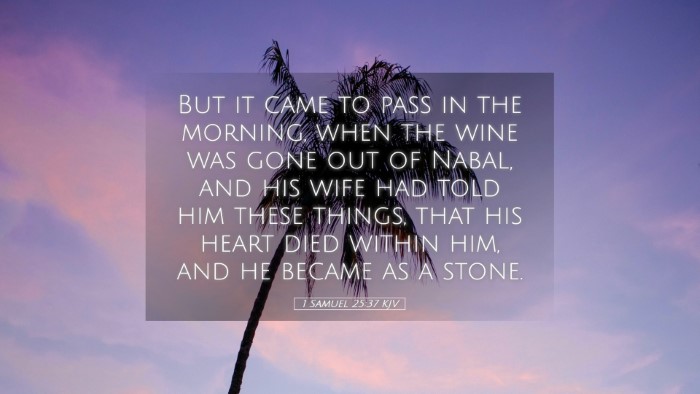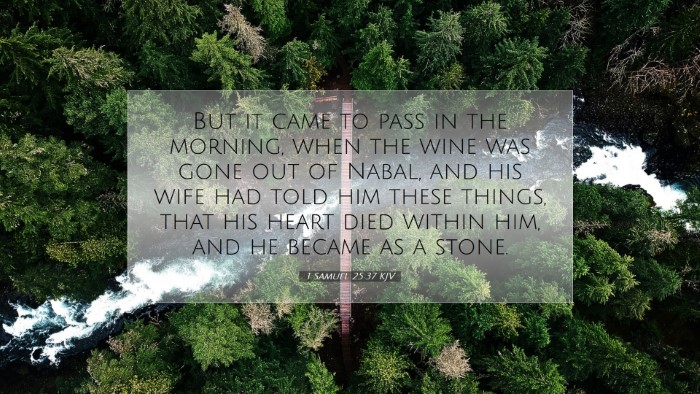Commentary on 1 Samuel 25:37
Text of the Verse: "But it came to pass in the morning, when the wine was gone out of Nabal, and his wife had told him these things, that his heart died within him, and he became as a stone."
Overview of the Context
The narrative of 1 Samuel 25 presents a dramatic episode involving David, Nabal, and Abigail. After David and his men protect Nabal's sheep, they seek provisions in return. Nabal’s refusal leads to a near-fatal confrontation. Abigail intervenes, preventing David from committing needless bloodshed. Following Nabal's drunken state and the revealing of Abigail's actions, the response of Nabal serves as a poignant moment in the larger story of David’s rise and God’s providence.
Theological Significance
This passage emphasizes the consequences of pride and foolishness, as exhibited by Nabal. His inability to recognize the mercy shown by David contrasts sharply with Abigail's wise actions. The transformation of Nabal’s heart into a metaphorical stone reflects the gravity of his spiritual and moral state. This serves as a reminder of the fragility of human life and the weight of divine justice.
Insights from Commentators
Matthew Henry
Henry notes that Nabal's heart dying within him signifies not just a physical response to shock but a spiritual paralysis. He comments that the acknowledgment of Abigail's actions came too late; Nabal’s foolishness led to his downfall. His deadened heart serves as a metaphor for an unrepentant sinner, devoid of spiritual awareness, thus highlighting the dangers of living in folly.
Albert Barnes
Barnes expounds on the phrase "became as a stone," indicating Nabal’s heart was not just physically affected but spiritually hardened. He emphasizes the divine element; Nabal's arrogance brought on the calamity. This serves as a warning for leaders and those in positions of influence, reminding them of the weight their decisions carry and the necessary reliance on God's guidance to avoid folly.
Adam Clarke
Clarke adds that the sudden shock of learning Abigail’s wisdom and his narrowly avoided demise led to Nabal’s state of panic. He interprets "his heart died within him" as a form of despair caused by self-realization; Nabal faced the consequences of his actions. Clarke suggests this moment illustrates a critical turning point—a man’s folly leading him to the brink of ruin. Understanding the gravity of our choices can lead to repentance, or in Nabal’s case, a tragic end.
Reflective Lessons for Modern Readers
- The Danger of Foolishness: Nabal’s actions underscore how pride and ignorance can lead to dire consequences. Believers are called to seek wisdom.
- The Role of Intercession: Abigail’s intervention is a model for how we can step in to rectify situations regarding others' conflicts.
- The State of the Heart: The condition of Nabal’s heart serves as a poignant reminder for self-examination. Our spiritual state impacts our decisions and relationships.
- Recognizing and Responding to God’s Providence: The unfolding events illustrate how God uses various channels to enact His will; Nabal's downfall opened the way for David and Abigail's union.
Conclusion
1 Samuel 25:37 encapsulates profound messages regarding the heart’s condition in light of wisdom and folly. The transition from Nabal’s arrogance to his impending doom presents a sobering reality of the consequences of sin. As believers engage with this text, they are urged to consider their paths and the implications of their decisions. Through a comprehensive understanding of this passage, ministries can encourage individuals to seek wisdom, embrace humility, and recognize the importance of their heart's condition before God.


